

Gau2 Lung4 Sing4 Zaai3•Wai4 Sing4
Hong Kong 2024
Genre:
Action, Crime
Director:
Soi Cheang
Cast:
Raymond Lam
Louis Koo
Sammo Hung
Terrance Lau
Philip Ng
Tony Wu Tsz Tung
German Cheung
Wong Tak Pun Kenny

Twilight of the Warriors: Walled In
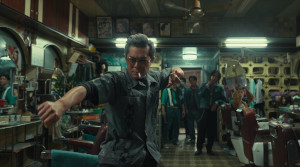
Story: Chan Lok-kwun (Raymond Lam) flees to Hong Kong in the 80s. There he comes across the gangster boss Mr. Big (Sammo Hung), who offers him to work for him after Lok-kwun wins an illegal fight. But Lok-kwun doesn't want anything to do with the triads, so he refuses, and he is just interested in the prize money. Since he wants to buy an ID card with the money, Mr. Big suggests making one for him. However, Mr. Big tricks the fugitive, so Lok-kwun grabs a bag which he assumes has money in it and flees. He finds shelter in Kowloon Walled City, which is under the control of Boss Cyclone (Louis Koo), thus, Mr. Big's henchmen do not follow him there. Then the refugee finds out that there are actually drugs in the bag, but when he wants to turn them into money, he gets into trouble with Cyclone's men. Eventually, however, Cyclone takes him in, into the city within the city. Lok-kwun goes to great lengths to establish a livelihood there and has several jobs at the same time. Cyclone takes notice of this and ultimately lets him work for him. He is not the typical gangster boss, instead he looks after his fellow men. The peace in Kowloon is about to be disrupted by Mr. Big and his crazy underling King (Philip Ng), though ...

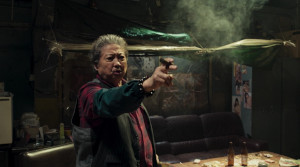


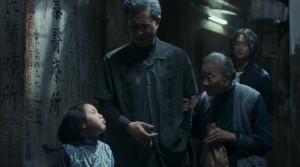
Review: It's hard to avoid the hype around "Twilight of the Warriors: Walled In" if you're interested in Asian cinema. After all, the flick is the second most successful Hong Kong movie in the former British crown colony ever. The breathtaking action sequences which were shared again and again on social media did the rest to get the movie talked about everywhere. However, if you are looking for an action spectacle that won't even allow you to take a breather, you will probably be a little disappointed here. At least that's what happened to me. But this generally even works to the movie's advantage because the director actually means to tell a real story, and therefore it also takes care of its characters. But the real stars of the movie are Kowloon and the wonderful images that director Soi Cheang manages to put on screen. The look reminds you of a neo-noir comic and Kowloon looks gloomy and dirty as well as cozy and inviting. A slum that shares suffering and joy, creating a very special atmosphere.
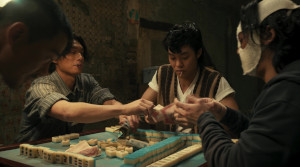
It should be pretty clear right from the beginning that everything boils down to a finale between Mr. Big and Cyclone, even though there might be minor deviations. While in similar works the first half of the movie is a necessary evil in order to get to the showdown and to be aware of people and possible loyalties, Soi Cheang pursues much more than that. He wants to breathe life into Kowloon creating a sense of nostalgia and neighborhood and brotherhood. This is where Louis Koo ("Death Notice") makes an appearance as Cyclone. The actor seems to be working hard lately to get more out of himself as an actor, and so this time, his character is not just the typical fatherly-type gangster boss who is fully hands-on and has an open ear for everyone, he also embodies what Kowloon is all about: a complex construct of labyrinthine corridors just trying to offer everyone the most comfortable life possible. Still, the relatively surprising depth and background story that he gets is not a given for everyone else.
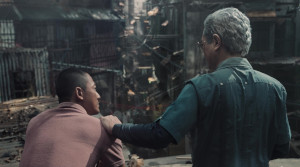
Raymond Lam ("Detective vs. Sleuths") represents the actual hero of the story. He is able to show the necessary screen presence, and Lok-kwun's doggedness and his genuine good heartedness are also visible at all times, but especially towards the end you start to wonder why he didn't get a little more color. This becomes even more obvious when you a look at his three buddies. There is clearly a certain chemistry, but since the three are written pretty flat, quite a lot of potential was wasted here - especially when you have the finale in mind, in which the four become the focus point. However, the movie is packed with actors who clearly have fun at what they are doing. Sammo Hung is also part of the cast and Aaron Kwok gets a tiny supporting role too. But Philip Ng as King is probably a small highlight here. His role is pleasantly exaggerated, which once again underlines the comic-like nature the flick sometimes has. Because King has supernatural abilities that make him immune to weapons or fists. But he is not the only one with special abilities.
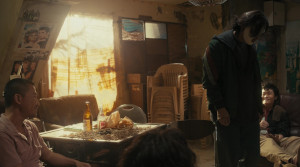
Kenji Tanigaki, who was already responsible for the fights in "Sakra", lets the fighters clash with enormous force. Cyclone's punches make his opponents spin around as if they were in a whirlwind, others slaughter their way through everything with two knives which might also contain other small knives hidden in their blades. In addition, parts of the surroundings are always destroyed too. All this leads to a great showdown, which is both pleasantly over-the-top and satisfying for genre enthusiasts. The style of the movie is no coincidence either, because the story is based on the novel "City of Darkness" by Yuyi and the corresponding manhua (/manga) by Andy Seto. Kowloon's Walled City is like an ulcer within the city, a self-contained system in which you immediately go down the chute if you don't help each other. And so, despite all the dark corners and alleys, neighborly help is very important, as we get to see in a few moving scenes. People also help each other because they know they'll need help themselves at some point.

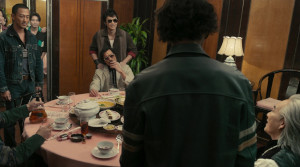
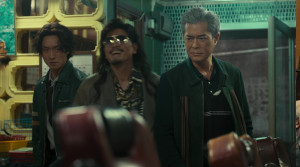

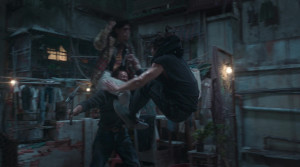
The sets and especially the Walled City are fantastic: A labyrinth that extends into three-dimensional space, stairs that lead to other stairs of completely different houses, signposts and signs that would drive outsiders crazy, and everywhere there are pipes, cables and tin roofs that seem to hold everything together. The fact that "Twilight of the Warriors: Walled In" isn't just an action spectacle, but also wants to remind us of bygone days and culture, is proven by the end credits, during which we can once more enjoy the ambience of the Walled City. It's hard to believe, but you can really feel at home, and a pleasant peace and quiet washes over you. With "Mad Fate" Soi Cheang recently proved that he can be quite original, and his "Limbo" was a good deal darker. Here, however, he seemingly wants to satisfy a larger audience, and, above all, he clearly put even more heart and soul into it. Action fans and fans of gangster thrillers alike will get their money's worth without having to put up with boring filler material. If you thought HK cinema was dead (and sometimes I had that impression too), you will finally be set right here.

Disclaimer










